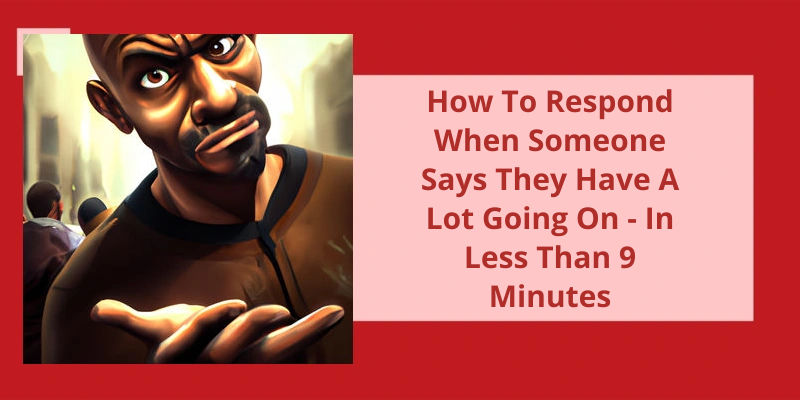In a fast-paced world filled with endless responsibilities and obligations, it's not uncommon to come across someone who’s overwhelmed and overburdened with the weight of multiple tasks and commitments. In less than 9 minutes, you can make a significant impact by providing a listening ear, offering support, and suggesting practical strategies to help alleviate their stress and find a sense of balance amidst the chaos. This guide will equip you with essential skills and techniques to respond effectively when someone says they’ve a lot going on, ensuring that your interactions are meaningful, supportive, and productive.
How Do You Respond to Been a Minute?
When someone says “It’s been a minute,” it indicates that it’s been a while since you last interacted or caught up. Responding effectively to this phrase requires acknowledging the time gap and expressing genuine excitement to reconnect. Start by acknowledging the time lapse and showing understanding, saying something like, “I know, it’s been such a long time since we last talked! I cant believe how fast time has flown by.”. By doing this, you demonstrate that you value the relationship and recognize the significance of the time gap.
Next, express genuine excitement to reconnect. Let them know how much youve missed them and how eager you’re to catch up. You can say something like, “Ive been looking forward to this moment! Ive missed our conversations and cant wait to hear about what youve been up to.”
Take this opportunity to share some updates about your own life. Briefly summarize the most significant events or experiences youve had since you last spoke. This allows you to provide some context and set the stage for a more engaging conversation. However, it’s important to strike a balance between sharing your own updates and showing genuine interest in the other persons life.
Show genuine interest in their experiences by asking open-ended questions and actively listening to their answers. You could say, “Im really curious to hear about whats been happening in your life. How have you been? Any exciting news or major milestones you want to share?”. By encouraging them to share their experiences, you create a space for meaningful conversation and connection.
Reminisce about past experiences and shared memories. This can help foster a sense of nostalgia and strengthen the bond between you. Bring up a funny or memorable moment you both experienced and express how much you enjoyed that time together. Sharing these stories can remind you both of the value you bring to each others lives.
Add humor to lighten the conversation and make it more enjoyable. Infuse some lightheartedness into your response, whether it’s through a funny remark or a playful question. This will help create a relaxed and friendly atmosphere, making the conversation more engaging and enjoyable for both parties.
Overall, responding effectively to “It’s been a minute” involves acknowledging the time gap, expressing genuine excitement to reconnect, sharing updates, showing genuine interest in the other persons life, reminiscing about past experiences, and adding humor to foster meaningful connections. Remember, the goal is to create an engaging and enjoyable conversation that strengthens your relationship.
Ways to Keep in Touch With Friends and Family During Busy Times
During busy times, it can be challenging to find the time to connect with friends and family. However, there are several ways to keep in touch and maintain those relationships:
1. Schedule regular check-ins: Set a specific time each week or month to catch up with your loved ones. This can be a phone call, video chat, or even a quick text message.
2. Use social media: Utilize platforms like Facebook, Instagram, or Twitter to stay connected. You can share updates, photos, and engage in conversations online.
3. Plan ahead: If you know you’ve a busy period coming up, inform your friends and family in advance. This way, they understand your constraints and can reach out accordingly.
4. Send thoughtful messages: Even if you can’t have a lengthy conversation, send a quick message to let your loved ones know you’re thinking of them. It can be as simple as a meme, a funny video, or a heartfelt quote.
5. Organize group activities: Coordinate group outings or gatherings that work for everyone’s schedule. This allows you to spend quality time with multiple loved ones at once.
Remember, maintaining relationships requires effort from both parties. Be understanding, flexible, and make an effort to stay connected, even during busy times.
Sometimes, we come across situations where we want to reach out to someone who seems busy or going through a tough time. Finding the right words to convey our support can be challenging. We want to show that we care and offer our help without being intrusive or burdensome. Here are a few suggestions on what to say when someone is busy or struggling, allowing you to express your concern and availability in a thoughtful way.
What Should I Say When Someone Is Busy?
When someone tells you they’ve a lot going on, it’s important to respond with empathy and understanding. One way to approach this is by simply expressing concern for their well-being. For instance, you could say, “Hey, I havent heard from you in a while. I hope youre OK. Just know Im here if you need me.”. This lets the person know that youre thinking about them and youre available to support them whenever they need it.
Another approach is to acknowledge their difficult situation and offer yourself as a listening ear. You could say, “It sounds like youre having a bad time right now. If you need someone to talk to, Im here whenever youre ready.”. This lets the person know that youre aware of their struggles and that youre willing to provide them with a safe space to express themselves.
Sometimes, people might feel overwhelmed and hesitant to burden others with their problems. In such cases, it can be helpful to reassure them that you genuinely want to be there for them. You could say, “I know you’ve a lot going on, but Im happy to listen if you want to offload. Remember, you don’t have to face everything alone.”
Additionally, it’s important to maintain open lines of communication while respecting their boundaries. You could say, “I understand that youre busy right now, but just know that Im here for you whenever youre ready to talk. Take your time, and know that Im only a phone call away.”. This conveys your availability while respecting their need for space and time to process their situation.
Lastly, it’s essential to prioritize their well-being and let them know that they aren’t a burden. You could say, “I know things are tough right now, but I want you to know that reaching out to me won’t ever be an inconvenience. I care about you, and Im here to support you in whatever way you need.”. This reassures them that they can rely on you without any guilt or worry about being a burden.
Overall, responding to someone who says they’ve a lot going on requires empathy, understanding, and a genuine willingness to be there for them. By expressing concern, offering a listening ear, respecting their boundaries, and reassuring them that they aren’t alone, you can provide meaningful support during their challenging times.
When someone tells you they’re busy, it’s important to respond in a respectful and understanding manner. There are several ways you can reply, such as brushing it off casually, wishing them a good day, or mentioning your availability. It’s also okay to ask them what they’re up to or playfully tease them, as long as it’s done in a light-hearted manner. However, if someone is genuinely busy, it’s best to give them space and not overwhelm them with your attention. You can always ask them out again in a few days when they might have more free time.
How Do You Respond When Someone Says They Are Busy?
When someone says they’ve a lot going on, it can be a tricky situation to navigate. The key is to respond with empathy and understanding. One way to do this is by brushing it off casually, acknowledging their busyness without making a big deal out of it. This shows that you respect their time and priorities.
Another way to respond is by simply wishing them a good day. This is a polite and friendly way to acknowledge their busyness while also expressing your well-wishes. It shows that you care about their well-being and understand that their busy schedule is important.
If youre interested in seeing the person again, you can mention when youre free. By doing this, youre indicating that youre still interested in spending time together, but youre also understanding of their current situation. This gives them the option to let you know when theyre available without any pressure.
Another approach is to ask them what theyre up to. This shows genuine interest in their life and allows them to share more about their current commitments. It also gives you an opportunity to understand their schedule better and find possible times to meet up.
If you’ve a playful dynamic with the person, you can try teasing them in a lighthearted way. This can show that you understand their busyness but also bring some humor into the conversation. However, it’s important to gauge their reaction and make sure theyre comfortable with this kind of banter.
Sometimes, it’s best to simply leave the person alone while theyre busy. Giving them the space they need shows that you respect their boundaries and understand that they’ve other priorities at the moment. This can also prevent you from coming across as needy or clingy.
Lastly, it’s important to give the person space to reach out. If theyre genuinely busy and have a lot going on, they may appreciate not being pressured or bombarded with messages. By giving them this space, youre allowing them to reach out when theyre ready and available.
Overall, responding when someone says they’ve a lot going on requires empathy, understanding, and respect. By taking these factors into account and choosing the appropriate response, you can maintain a positive dynamic with the person while also respecting their boundaries and priorities.
Tips for Managing and Prioritizing One’s Own Busyness
Managing and prioritizing our own busyness is crucial for maintaining productivity and well-being. Here are a few tips to help navigate a packed schedule:
1. Assess and Prioritize: Start by evaluating your tasks and commitments. Identify the most important ones and prioritize them accordingly. Focus on completing high-priority items first.
2. Delegate and Collaborate: Don’t be afraid to delegate tasks to others when possible. This can help lighten your workload and allow you to focus on more critical tasks. Additionally, collaborating with colleagues can help distribute the responsibilities evenly.
3. Set Realistic Goals: Avoid overcommitting yourself by setting realistic goals. Be aware of your limitations and make sure to allocate sufficient time and resources for each task.
4. Time Management Techniques: Utilize effective time management techniques such as the Pomodoro Technique or time blocking. These methods can help improve productivity and ensure that work is completed within designated timeframes.
5. Learn to Say No: It’s important to establish boundaries and prioritize self-care. Learn to say no to non-essential tasks or commitments that may overwhelm your schedule or detract from your well-being.
By implementing these tips, you can gain better control over your busyness and reduce stress while maintaining productivity.
Source: What should I reply when someone says busy as usual?..
“It’s been a minute” is a casual expression used to convey the idea that a significant amount of time has passed since two individuals last communicated. It can be understood as a substitute for saying “We haven’t talked in a while” or “It’s been a long time since we last spoke.” The phrase highlights the perceived duration of the period of non-communication between the individuals involved.
What Does It Mean When Someone Says Been a Minute?
When someone says “It’s been a minute,” they’re using a colloquial expression that signifies a significant amount of time has passed since the last interaction or conversation. In this context, “a minute” doesn’t literally refer to 60 seconds, but rather a more extended period. It’s akin to saying, “We havent talked in a while” or “It’s been a long time since we last spoke.”
This phrase carries a sense of nostalgia and implies that the relationship between the individuals involved has perhaps faded or become less frequent over time. It often indicates a desire to reconnect and catch up on each others lives. By using this expression, the speaker acknowledges the passage of time and signals their readiness to rekindle the connection.
It can be a gentle way of indicating that they miss the other persons presence and are interested in renewing the bond they once shared.
In response to such a statement, one can use similar casual language to acknowledge the time gap and reestablish a connection. Saying something like, “Yeah, it really has been a while! We should definitely catch up soon,” shows a willingness to bridge the gap and initiate a conversation or meeting. Recognition of the passage of time and enthusiasm for reconnecting can help foster a renewed connection between two people who’ve lost touch.
‘Not much, you?’ is a common response that indicates nothing eventful is happening. On the other hand, replying with ‘I just finished work. What about you?’ suggests an interest in the other person’s activities. These responses serve as simple ways to initiate or continue a conversation. However, there are various other approaches to engaging with this question, depending on the context and tone desired. Let’s explore some alternatives.
What’s a Good Response to What’s Going On?
Whats a good response to whats going on? So some common answers could be Not much, you? This is saying that not much is happening. Another common response could be I just finished work. What about you? This indicates that the person has been occupied with work and is curious about the other persons activities. Additionally, a possible reply could be Oh, Ive been really busy lately with my new project. How about yourself? This acknowledges the speakers current workload while showing reciprocal interest in the other persons situation.
Furthermore, a suitable response could be Life has been quite hectic lately, but Im managing. This communicates that the individual has been dealing with a lot of tasks or stress but is still handling it. Another helpful answer could be Ive had a lot going on recently, but it’s all part of the adventure. This conveys that the person has been experiencing various events or challenges but maintains a positive outlook. Moreover, a potential response could be Things have been quite chaotic lately, but Im trying to stay on top of it all. What’ve you been up to? This suggests that the individual is currently facing multiple demands or situations and wants to hear about the other persons activities.
In summary, when someone asks whats going on, there are several suitable responses that acknowledge the persons question while reciprocating interest. The responses can vary from indicating a lack of significant events to mentioning specific tasks or projects that have been occupying their time. It’s important to keep the conversation balanced and considerate by asking about the other persons situation as well. By doing so, a meaningful and engaging conversation can be fostered.
How Do You Handle a Busy Schedule?
Handling a busy schedule can be challenging, but there are several strategies you can use to stay organized and manage your time effectively. One approach is to prioritize tasks and responsibilities, focusing on the most important ones first. This can help you avoid feeling overwhelmed and ensure that you’re tackling key priorities. It’s also helpful to establish a routine and stick to it as much as possible. By setting specific times for activities such as work, exercise, and relaxation, you can create a sense of structure in your day. Another valuable strategy is to learn to delegate tasks when possible. If you’ve too many responsibilities, consider asking for help or outsourcing certain tasks to lighten your load. Finally, it’s essential to take care of yourself by practicing self-care. This includes getting enough sleep, eating nutritious meals, and scheduling time for relaxation and recreation. Taking care of your physical and mental well-being will give you the energy and resilience needed to handle a busy schedule effectively.
“When people say they’re busy it makes them feel that their life is important and their presence matters to the people around them,” Kim says. However, in today’s fast-paced world, it seems that being busy has become a badge of honor. Many people often find themselves caught up in a never-ending cycle of work, responsibilities, and social commitments, leaving little time for themselves. But is this busyness truly indicative of a fulfilling and purposeful life, or is it merely a societal construct? Let’s explore the concept of busyness and whether it truly serves us in the pursuit of happiness and fulfillment.
When People Say They Are Busy?
When people say they’re busy, it often evokes a sense of significance and importance in their lives. It creates a perception that their presence and contributions matter to the people around them. Kim, a renowned psychologist, emphasizes that this statement serves as a reflection of ones value and worth in society. The concept of busyness has become intertwined with our sense of self-worth, reinforcing the idea that being occupied equates to being valuable.
However, it’s important to approach individuals declaring their busyness with empathy and understanding. Instead of dismissing their claims or assuming they’re exaggerating, it’s crucial to acknowledge and validate their experiences. Recognizing that their responsibilities and commitments could be overwhelming allows for a more supportive and compassionate interaction.
Responding when someone says they’ve a lot going on in their life comes down to showing genuine interest and concern. Engaging in active listening and asking follow-up questions demonstrates that you value what they’ve to say. Providing a safe space for them to express their emotions and thoughts can be incredibly beneficial for their well-being.
Moreover, it’s essential to offer assistance or lend a helping hand if possible. Whether it means taking on some of their workload, offering advice, or simply being there as a supportive presence, your willingness to offer support can make a significant difference. By showing that you’re invested in their well-being, you create a sense of community and reinforce the idea that they aren’t alone in their struggles.
Lastly, it’s important to respect their boundaries. While your intention may be to help, they may not always be open to receiving assistance or discussing their challenges in great detail. Some individuals prefer to keep their private lives separate from their social interactions, and it’s crucial to respect their choices. Being understanding and non-intrusive will allow them to open up at their own pace, if they choose to do so.
When someone says they’ve a lot going on, it’s vital to approach the situation with empathy and understanding. Acknowledge the significance of their statement and offer support without judgment. By showing genuine interest, providing a listening ear, and respecting their boundaries, you can create a safe space where they feel valued, heard, and supported.
The Impact of Busyness on Mental Health
The Impact of Busyness on Mental Health
Busyness can have a significant impact on mental health. When someone constantly says they’ve a lot going on, it often indicates a high level of stress and overwhelm. This ongoing state of busyness can lead to various mental health issues, such as anxiety, depression, and burnout.
When individuals are constantly juggling multiple tasks and responsibilities, they may neglect self-care and rest, which are crucial for maintaining good mental well-being. The constant pressure to keep up with a busy schedule can also result in feelings of inadequacy, guilt, and heightened levels of stress.
It’s important to respond empathetically and supportively when someone expresses that they’ve a lot going on. By offering a listening ear, understanding, and validating their feelings, you can help create a safe space for them to share their challenges. Encouraging them to prioritize self-care, delegate tasks, and set boundaries can also help alleviate some of the negative effects of busyness on their mental health.
In conclusion, the impact of busyness on mental health is significant. By recognizing the toll that constant busyness can take on individuals and offering support, we can contribute to better mental well-being.
Conclusion
In conclusion, managing how we respond when someone tells us they’ve a lot going on can greatly impact our relationships and the support we offer. By taking the time to validate their feelings, empathize with their situation, and actively listen without judgment, we can create a safe space for them to express their emotions and concerns. Offering assistance or suggesting practical solutions can also demonstrate our willingness to help. However, it’s important to respect their boundaries and remember that they may simply need someone to listen. Ultimately, our response should be compassionate, understanding, and mindful, enabling us to build stronger connections and provide the support they need in under nine minutes.






